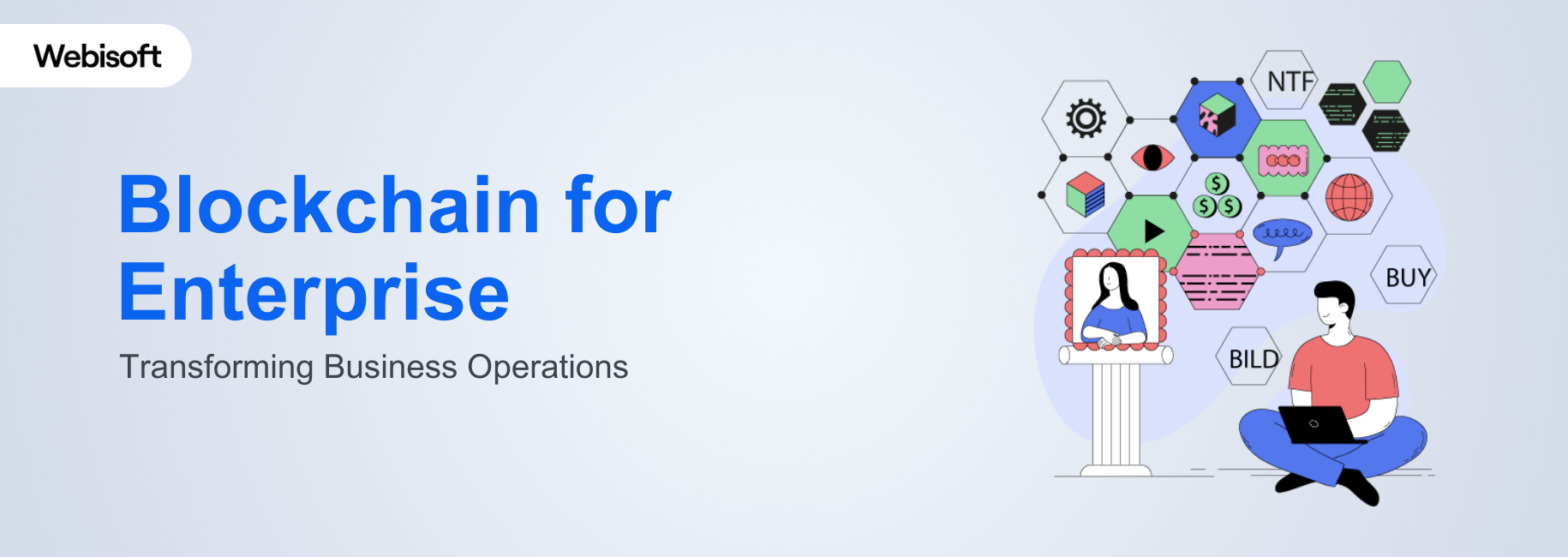Is your business struggling with too much paperwork, trust issues with partners, and problems getting things done efficiently? You’re not alone. A large number of businesses worldwide have these same issues. But what if there’s a solution that can make things better? Here comes blockchain for enterprise.
But wait, isn’t blockchain mainly associated with Bitcoin and other cryptocurrencies? Well, blockchain originally started with digital coins, but its usefulness goes far beyond that.
Blockchain for enterprise offers improved data security, transparency, and trust-building mechanisms. It simplifies operations through smart contracts, reduces costs, and improves auditing. Moreover, it prepares businesses for future technology changes, making it valuable across industries for long-term efficiency and competitiveness.
Interested in learning more? In this article, we’ll learn about the benefits, challenges, and real-world uses of blockchain for enterprises in detail. By the end, you’ll understand how it can improve trust, cut costs, and provide unmatched security. Let’s start!
Contents
- 1 What is Enterprise Blockchain?
- 2 Why Is the Enterprise Blockchain Essential for Business?
- 3 How can Blockchain Benefit Enterprise?
- 4 Enterprise Blockchain Applications
- 5 Challenges of Blockchain for Enterprise
- 6 Future of Enterprise Blockchain
- 7 Why Should You Choose Webisoft for Implementing Blockchain for Enterprise
- 8 Final Note
- 9 FAQs
What is Enterprise Blockchain?
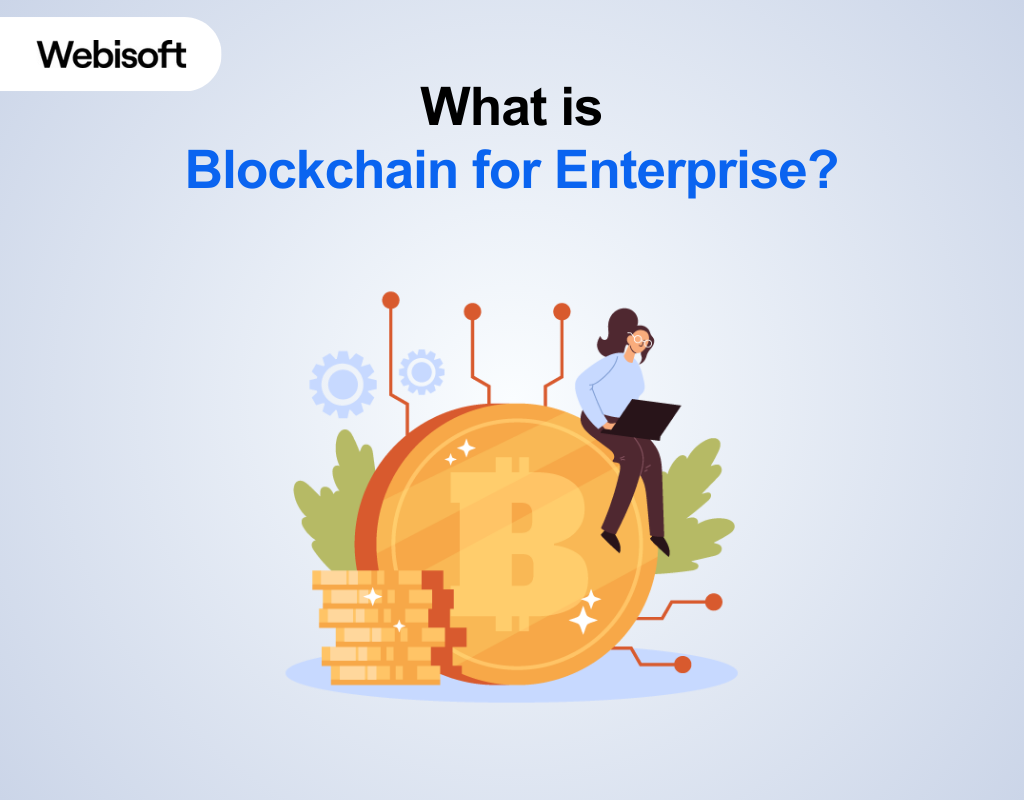
An enterprise blockchain is a controlled type of blockchain technology that’s used to improve various business processes, like tracking supplies, handling international transactions, and securely sharing digital information within and between companies.
It functions as a digital ledger, recording entries (known as blocks) in a chronological and encrypted manner, serving as a single data source across a distributed network.
Typically, this kind of blockchain is only accessible to a select group of users, and the business has full control over who can access it. This control allows corporations to keep their data secure and aligns with their specific needs, making it more suitable than a public blockchain like Bitcoin.
Enterprise blockchains use cryptography to prevent unauthorized changes to transaction history. Some of the world’s largest and most well-known companies, such as Facebook, IBM, Intel, and Walmart, are already using enterprise blockchains in their operations.
Why Is the Enterprise Blockchain Essential for Business?
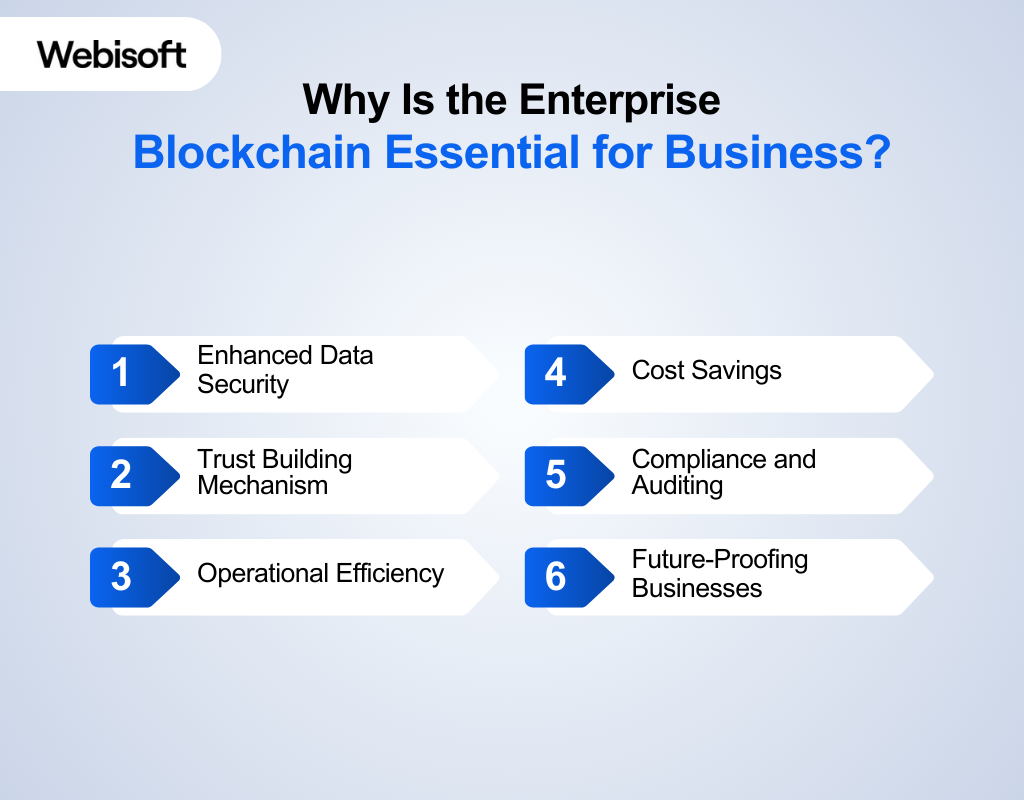
Enterprise blockchain is essential for businesses due to several reasons. Some of them are:
Improved Security
Blockchain is known for its strong security. It protects transactions with advanced encryption, reducing the chances of data breaches and fraud. This security gives companies confidence by safeguarding important information.
Building Trust
Blockchain removes middlemen, creating a direct link between parties. This decentralization increases trust among everyone involved, as it reduces the need for third-party verification.
Increased Efficiency
Blockchain uses smart contracts to automate complex processes. These contracts automatically apply rules, cutting down on manual work and making operations smoother. Instant access to data improves decision-making, speeds up transactions, and boosts overall efficiency.
Cost Savings
Blockchain allows direct transactions, cutting out intermediaries and lowering costs in various business activities. Moving to digital transactions also cuts down on paperwork and administrative expenses, saving money.
Compliance and Auditing
Blockchain’s unchangeable records make auditing straightforward, with clear and permanent transaction histories. Smart contracts can include compliance rules, ensuring automatic adherence to laws, and reducing the risk of penalties.
Future-Proofing Businesses
Blockchain’s flexibility means it can evolve with new technologies, keeping businesses ahead in digital trends. It can be customized for different sectors, such as finance, healthcare, and supply chains, making it a versatile tool for the future.
How can Blockchain Benefit Enterprise?
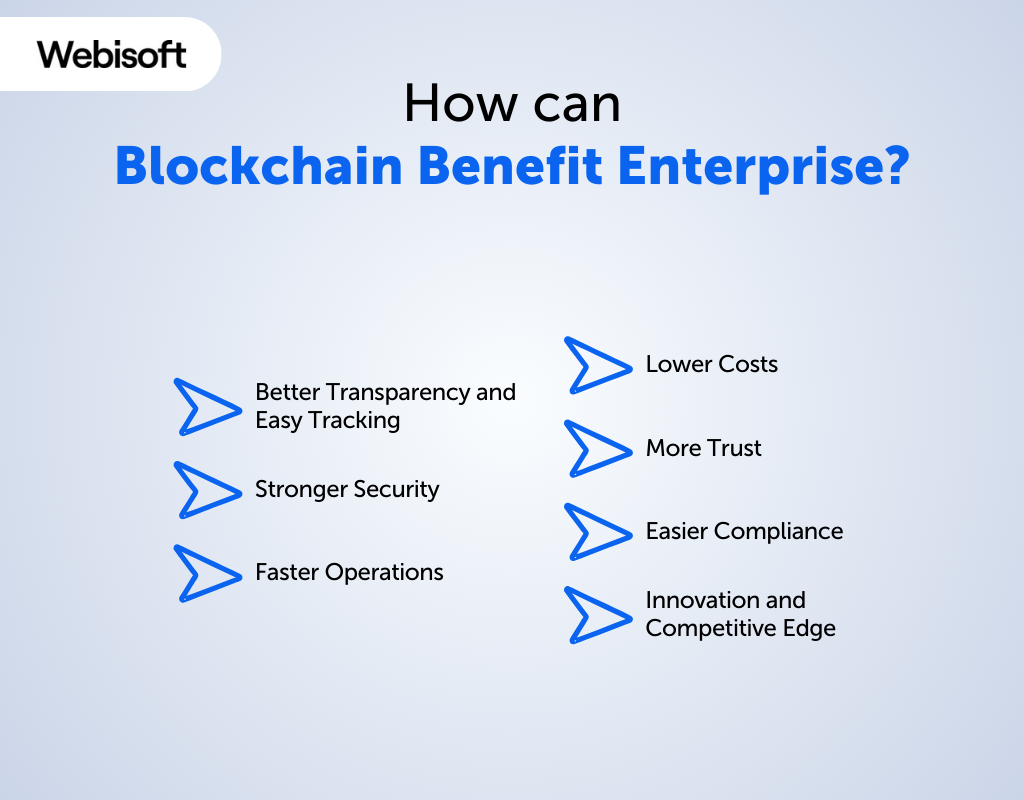
Blockchain technology offers significant advantages for businesses, making operations more efficient and secure. Here’s how blockchain can help businesses:
Better Transparency and Easy Tracking
Blockchain creates a clear record of transactions and data, which can’t be changed. This makes it easier for businesses to follow the path of goods in supply chains, ensuring products are genuine and processes are open for everyone to see.
Stronger Security
Thanks to its advanced encryption and decentralized setup, blockchain is very secure against data theft and fraud. Since information is spread across many computers, it’s very hard for hackers to tamper with the data, making it a safe choice for businesses handling sensitive information.
Faster Operations
Blockchain can speed up business activities and cut down on manual work by using smart contracts and removing middlemen. Smart contracts automatically complete transactions once conditions are met, reducing delays and mistakes found in traditional processes.
Lower Costs
Blockchain helps save money by cutting out third-party verifiers, reducing transaction fees, and making processes more direct and less costly. It also saves on labor and paper-related expenses by digitizing and automating tasks.
More Trust
With blockchain, transactions and data are clear, accurate, and secure, which builds trust among businesses, partners, and customers. Customers can check product authenticity and ethical sourcing, improving confidence in the business.
Easier Compliance
Blockchain’s unchangeable records simplify meeting regulatory and auditing standards. Businesses can easily provide a transparent record for compliance, lowering the risk of legal issues and fines.
Innovation and Competitive Edge
Adopting blockchain, businesses can lead in innovation, gaining advantages in efficiency, security, and customer trust. It also opens up new opportunities for value-added services and new business models, enhancing the customer experience.
Enterprise Blockchain Applications
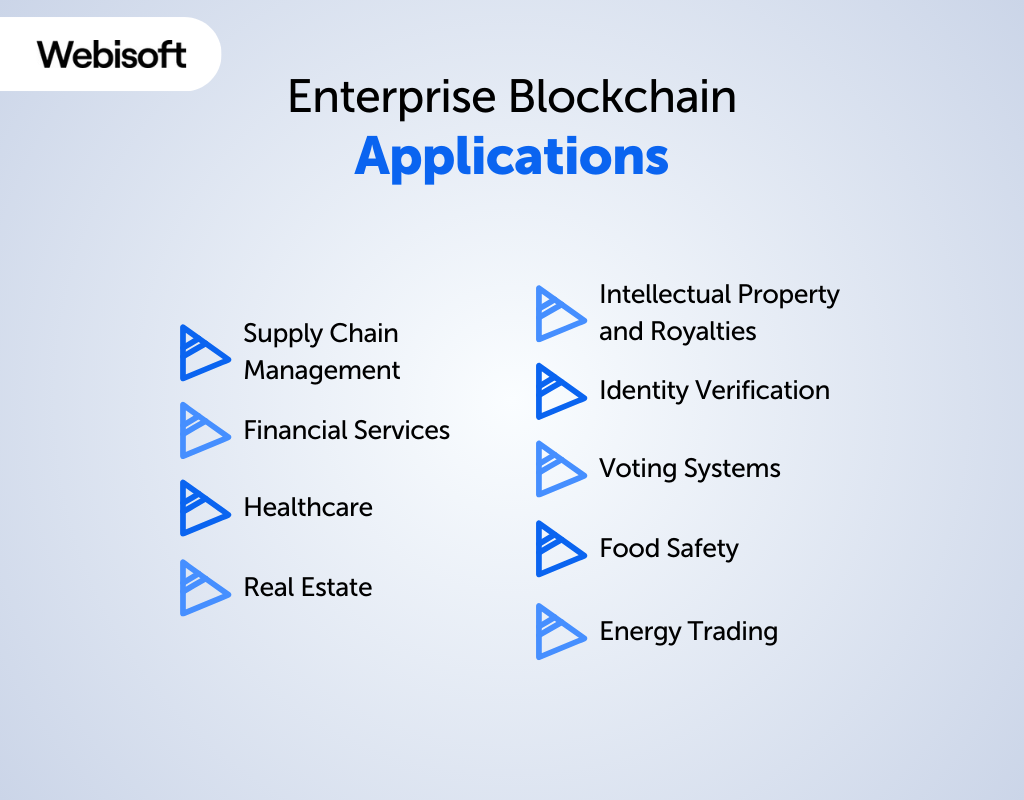
Blockchain for enterprise is reshaping how industries operate, offering solutions that are secure, transparent, and efficient. Here are some enterprise blockchain use cases and applications:
Supply Chain Management
Blockchain provides a transparent and immutable ledger, enabling companies to track the production, shipment, and delivery of products in real-time. This visibility helps in preventing fraud, ensuring authenticity, and improving the efficiency of supply chains.
It also helps in verifying the ethical sourcing of products, which is increasingly important to consumers.
Financial Services
In banking and finance, blockchain enterprise facilitates faster transactions by reducing the need for intermediaries, which can slow down processes and add costs.
It supports secure and efficient cross-border payments, trade finance, and compliance management by providing an unalterable record of transactions, simplifying auditing, and reducing fraud.
Healthcare
Blockchain can securely manage patient records, ensuring they are unchangeable and accessible only by authorized parties. It improves the sharing of medical data among health providers, enhancing patient care. Blockchain also streamlines the tracking of pharmaceuticals to prevent counterfeits and ensures the integrity of the supply chain.
Real Estate
By tokenizing property rights, blockchain simplifies property transactions, reducing paperwork and making the process more transparent. It helps in verifying ownership history, ensuring the accuracy of records, and reducing fraud. Blockchain also enables smart contracts for automatic lease management and payments.
Intellectual Property and Royalties
Blockchain offers a secure way to manage intellectual property rights and automate royalty payments using smart contracts. This use case is particularly relevant for the music and entertainment industries, where blockchain can track content distribution and ensure artists and creators are fairly compensated.
Identity Verification
Blockchain provides a secure and immutable platform for managing digital identities, reducing the risk of identity theft and fraud. It can streamline verification processes for businesses and individuals, making it easier to prove identity and access services.
Voting Systems
Blockchain can be used to create secure and transparent voting systems, ensuring that votes are immutable and accurately counted. This has potential applications in governmental elections, corporate governance, and anywhere where secure, anonymous voting is required.
Food Safety
By tracking the production, processing, and distribution of food products on a blockchain, companies can quickly trace the origin of food items in the event of a recall. This improves food safety, reduces health risks, and increases consumer trust in food brands.
Energy Trading
Blockchain enables peer-to-peer energy trading. This allows households and businesses with renewable energy sources to sell excess energy directly to others without going through a central grid. This decentralizes energy distribution and encourages the use of renewable energy.
Challenges of Blockchain for Enterprise
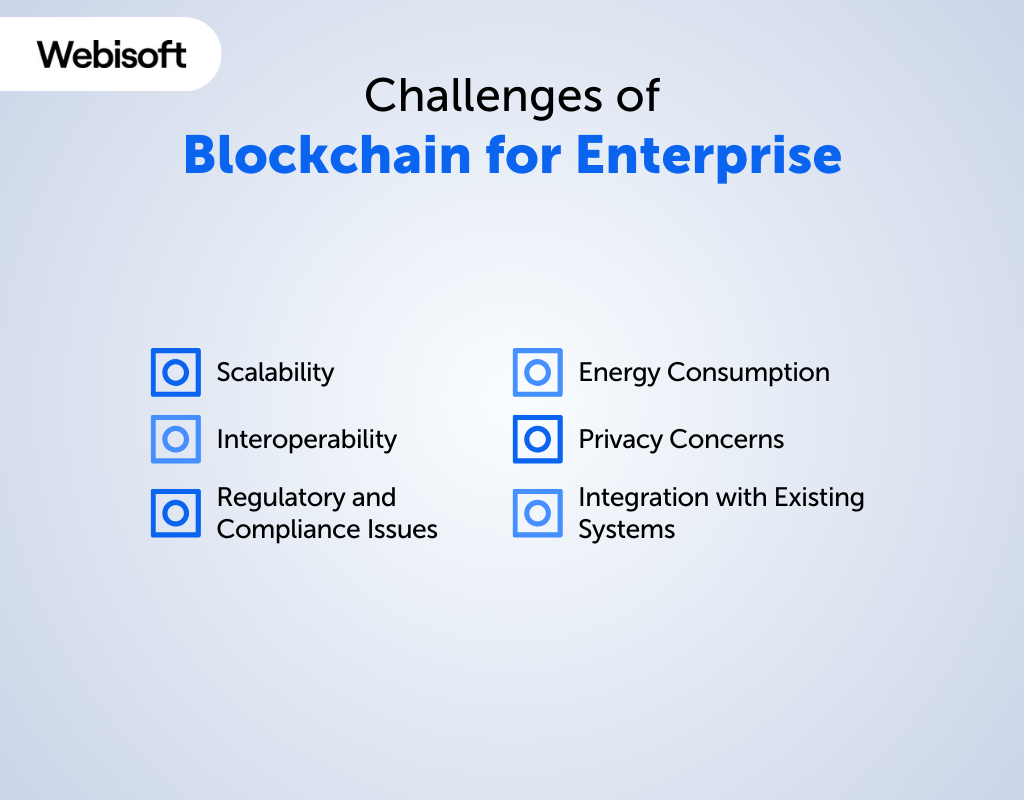
While blockchain technology offers numerous advantages for enterprises, it also comes with a set of challenges. Here are some key challenges:
Scalability
Blockchain networks, especially those using proof-of-work (PoW) consensus mechanisms, can face scalability issues. As the number of transactions increases, the network can become slower and more expensive to use. Finding a balance between decentralization, security, and scalability remains a challenge for many blockchain projects.
Interoperability
Different blockchain networks often operate in silos, with limited ability to communicate or share data. This lack of interoperability can hinder the seamless exchange of information across various blockchain systems, affecting the efficiency and effectiveness of blockchain applications in enterprise environments.
Regulatory and Compliance Issues
The regulatory landscape for blockchain technology is still evolving, with varying regulations across jurisdictions. Enterprises need to navigate these uncertainties and ensure compliance with all relevant laws and regulations, which can be complex and resource-intensive.
Energy Consumption
Blockchain networks that rely on PoW consensus mechanisms, like the original implementation of Bitcoin, require significant amounts of energy, raising concerns about their environmental impact. Enterprises are increasingly looking for more energy-efficient blockchain solutions to mitigate these concerns.
Privacy Concerns
While blockchain offers transparency, it can also raise privacy issues, especially for businesses handling sensitive or personal data. Finding ways to leverage blockchain for its transparency and immutability while also ensuring data privacy and protection is a challenge for many enterprises.
Integration with Existing Systems
Integrating blockchain technology with existing enterprise systems and processes can be complex and costly. Organizations must ensure that blockchain solutions work seamlessly with legacy systems, which may require significant modifications or custom solutions.
Future of Enterprise Blockchain
The future of enterprise blockchain looks promising. Let’s look at some of its future trends:
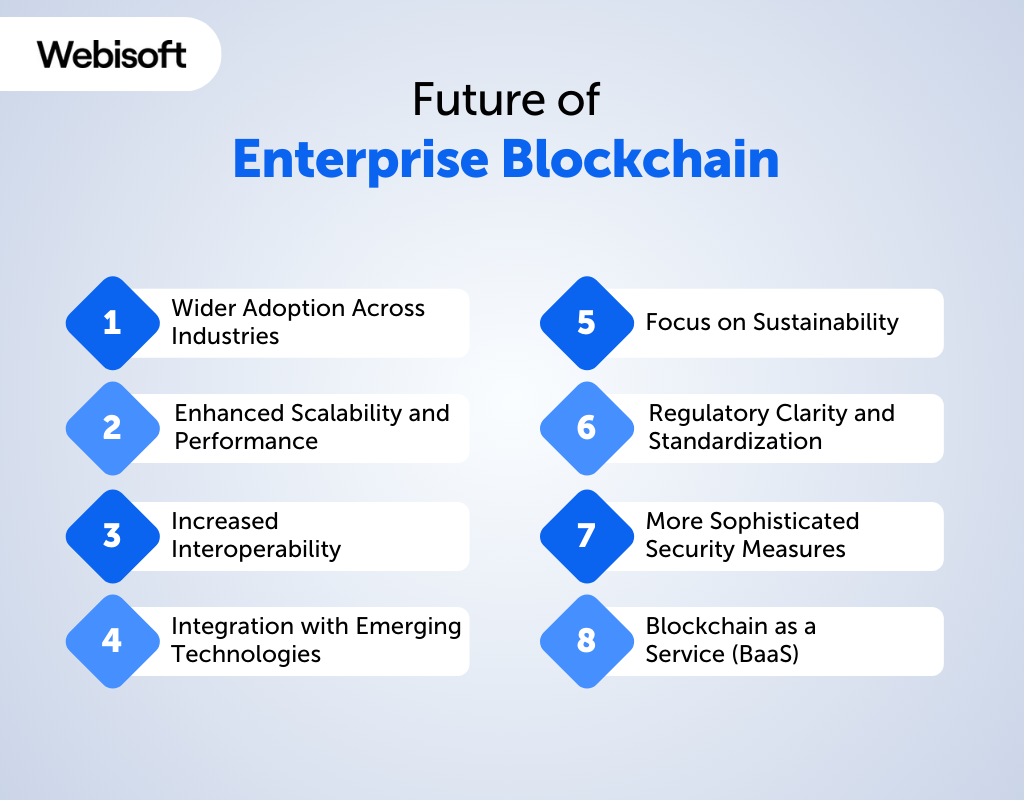
Wider Adoption Across Industries
Blockchain will likely see broader adoption beyond its initial strongholds in finance and supply chains. Industries such as healthcare, government, real estate, and energy are beginning to explore and implement blockchain solutions.
These solutions are being used for a variety of use cases. They range from secure patient records and property transactions to transparent government operations and efficient energy trading.
Enhanced Scalability and Performance
One of the main challenges facing current enterprise blockchain platform is scalability. Future advancements in blockchain technology are expected to address these issues. These advancements will offer solutions that can handle larger volumes of transactions quickly and efficiently, making blockchain more practical for enterprise-scale applications.
Increased Interoperability
As the number of blockchain platforms grows, interoperability— the ability of different blockchain systems to communicate and share information—will become increasingly important. Efforts are underway to develop standards and protocols that enable interoperability, which will facilitate smoother transactions across diverse blockchain networks and traditional systems.
Integration with Emerging Technologies
Blockchain’s integration with other emerging technologies, such as the Internet of Things (IoT), artificial intelligence (AI), and 5G, will unlock new possibilities. For instance, blockchain can secure IoT devices and networks, while AI can enhance blockchain efficiency by optimizing consensus mechanisms and smart contract functionality. Together, these technologies can drive innovation in areas like smart cities, autonomous vehicles, and personalized healthcare.
Focus on Sustainability
As environmental concerns become more pressing, there will be a greater focus on developing more energy-efficient consensus mechanisms than the traditional proof-of-work (PoW). Proof-of-stake (PoS) and other consensus models offer alternatives that consume less energy, aligning blockchain technology with sustainability goals.
Regulatory Clarity and Standardization
As blockchain becomes more mainstream, we can expect clearer regulations and standards to emerge. This will help businesses navigate compliance more easily and foster a more secure and trustworthy environment for blockchain applications.
More Sophisticated Security Measures
While blockchain is known for its security, the technology is not immune to threats. Future developments will likely include more sophisticated security measures to protect against vulnerabilities, ensuring that enterprise blockchain solutions remain secure against evolving cyber threats.
Blockchain as a Service (BaaS)
The rise of Blockchain as a Service (BaaS) platforms will lower the barrier to entry for enterprises looking to adopt blockchain technology. BaaS offers businesses the ability to use cloud-based solutions to build, host, and use their own blockchain apps and functions, making it easier and more cost-effective to explore blockchain’s benefits.
Why Should You Choose Webisoft for Implementing Blockchain for Enterprise
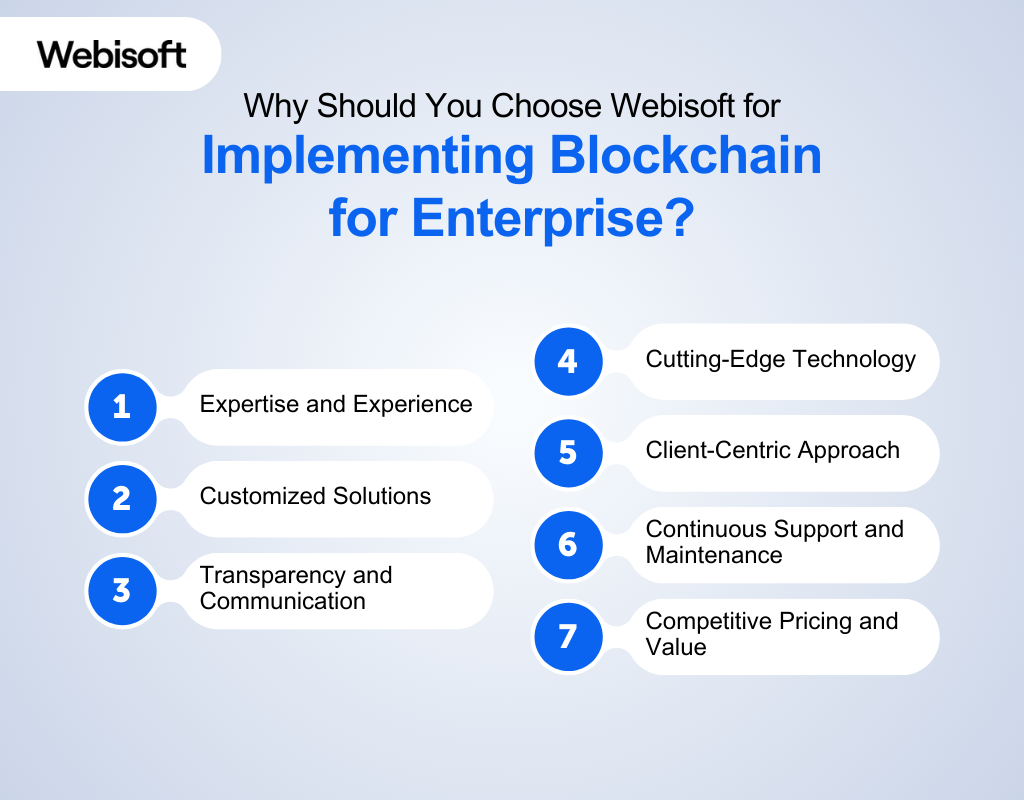
Selecting the right partner for implementing blockchain technology into your business operations is a critical decision.
Webisoft stands out as a premier choice. Here are some reasons why you should choose Webisoft’s blockchain development service:
Expertise in Blockchain Technology
Our team is highly skilled in blockchain technology. We know all about the various blockchain platforms and smart contracts and can customize these solutions to meet the unique needs of your business.
Proven Track Record
Webisoft has a proven track record of successfully implementing blockchain solutions across different sectors. Our experience is backed by case studies and positive feedback from clients, showing our ability to deliver effective solutions.
Comprehensive Service Offering
We offer a complete package of services, from the initial strategy and consulting to building, deploying, and supporting your blockchain solution. We’re here to guide you at every step of your blockchain journey.
Industry-Specific Customization
We understand that each industry has its own set of challenges. That’s why we create blockchain solutions that are specifically designed to address the unique requirements of your industry, ensuring that our solution fits your business perfectly.
Uncompromised Security
Security is a top concern in blockchain applications, and we take it very seriously. We use the best security practices and regularly check our systems to make sure your blockchain solution is secure.
Scalable and Interoperable Solutions
Our blockchain solutions are designed to grow with your business. They’re scalable and can easily integrate with your existing systems, ensuring that your investment in blockchain technology is future-proof.
Dedicated Support and Maintenance
Blockchain technology evolves quickly, but we keep our solutions up to date with continuous support and maintenance. This ensures that your blockchain system remains effective and efficient over time.
Final Note
In summary, our exploration of Blockchain for Enterprise has covered its benefits, use cases, challenges, and upcoming feature trends that will continue to shape its development.
Now it’s obvious that blockchain will play a big role in businesses. As everything moves more online, keeping data safe and making operations run smoothly are more important than ever. Success for any business will depend on staying ahead with the latest tech, and blockchain is what can set a company apart.
Are you looking to push your business forward? Webisoft is here to help you unlock the potential of this game-changing technology. Check out our website to see how we can create blockchain solutions just for your business’s specific needs.
FAQs
What industries benefit the most from blockchain for enterprise?
Industries such as finance, healthcare, supply chain, and logistics are getting huge benefits using blockchain. Aside from that, diverse enterprise blockchain applications are also helping the enterprise industries a lot.
How does blockchain improve supply chain management?
Blockchain improves supply chain management by providing a transparent and immutable ledger, reducing fraud, improving traceability, and increasing trust among participants.
Can blockchain be applied to small businesses, or is it mainly for large enterprises?
Blockchain can certainly benefit small businesses by enhancing security, transparency, and efficiency. While often associated with large enterprises, blockchain’s adaptability makes it a valuable tool for businesses of all sizes.
What are some notable enterprise blockchain companies?
Some well-known enterprise blockchain company include IBM, Microsoft, Binance, ConsenSys, and R3.
